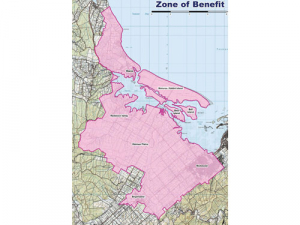Fruit fly discovery puts growers, exporters on edge
Fruit growers and exporters are worried following the discovery of a male Queensland fruit fly in Auckland this week.
 The proposed zone of benefit of the Waimea Community Dam as published in a 2017 Tasman District Council consultation document. SUPPLIED
The proposed zone of benefit of the Waimea Community Dam as published in a 2017 Tasman District Council consultation document. SUPPLIED
Horticulture NZ is welcoming the Tasman District Council’s U-turn on the Waimea Community Dam project.
The $102 million project envisages damming the Waimea River in the Lee Valley, in the ranges east of the Waimea Plains. It aims to use the stored water for agricultural irrigation on the plains, and to protect urban water supplies and river flows in dry periods.
The project is on again after the Tasman District Council voted to reverse an earlier ‘no’ decision on the basis of a revised funding model which mayor Richard Kempthorne said would lower the expected costs for ratepayers.
Richard Palmer, the acting chief executive of Horticulture NZ, says the Tasman district is a prime horticulture area -- the second-largest grower of apples and a big producer of kiwifruit, berries and vegetables.
“The key thing is that... for farming businesses to contribute to the economy and keep hiring people, they need certainty [about] water.”
Palmer acknowledges a personal interest in the scheme: his father John Palmer is the strategic advisor to the project. And he is a director of a packing business in the district, although the family’s orchard is outside the irrigation area.
Palmer says some people seemed to think farmers’ existing water rights should be curtailed to provide for increased river flows and urban water take. He says the dam will address all three fundamental issues: raising minimum flows in line with the national water policy statement, irrigation, and urban water use.
Palmer says it costs several hundred thousand dollars to set up a kiwifruit orchard. He believes people would not make that investment if they thought the vines would die in the second year due to a lack of water.
Horticulture is a key economic driver of the region. “Horticulture is an expensive investment. It delivers very high economic returns on a per hectare basis but that’s only possible with the necessary infrastructure, including certainty of access to water,” Palmer says.
He says people who argued that only “rich farmers would benefit” were forgetting that a minimum flow issue in the Waimea River still had to be addressed.
“If you want to address that, you must have some sort of recharge.”
Palmer says it is not just irrigators who will benefit from the dam.
“A whole lot of industries needing water would lose it in dry periods. It’s not just irrigators, yet it’s irrigators – together with their funders – who are stumping up [most] of the money.”
The dam project was revived when three councillors who had voted against it nine days earlier changed their votes after hearing the revised proposal behind closed doors.
The project also benefits from loan funding from Crown Irrigation Investments Ltd (CIIL).
When the Government said in April that it would end CIIL funding for large irrigation projects, several proposed schemes were put at risk; but Waimea was identified as one of three -- along with stage two of Central Plains and the Kurow Duntroon scheme -- for which existing funding commitments would be met.
Fonterra’s impending exit from the Australian dairy industry is a major event but the story doesn’t change too much for farmers.
Expect greater collaboration between Massey University’s school of Agriculture and Environment and Ireland’s leading agriculture university, the University College of Dublin (UCD), in the future.
A partnership between Torere Macadamias Ltd and the Riddet Institute aims to unlock value from macadamia nuts while growing the next generation of Māori agribusiness researchers.
A new partnership between Dairy Women’s Network (DWN) and NZAgbiz aims to make evidence-based calf rearing practices accessible to all farm teams.
Despite some trying circumstances recently, the cherry season looks set to emerge on top of things.
Changed logos on shirts otherwise it will be business as usual when Fonterra’s consumer and related businesses are expected to change hands next month.

OPINION: Here w go: the election date is set for November 7 and the politicians are out of the gate…
OPINION: ECan data was released a few days ago showing Canterbury farmers have made “giant strides on environmental performance”.